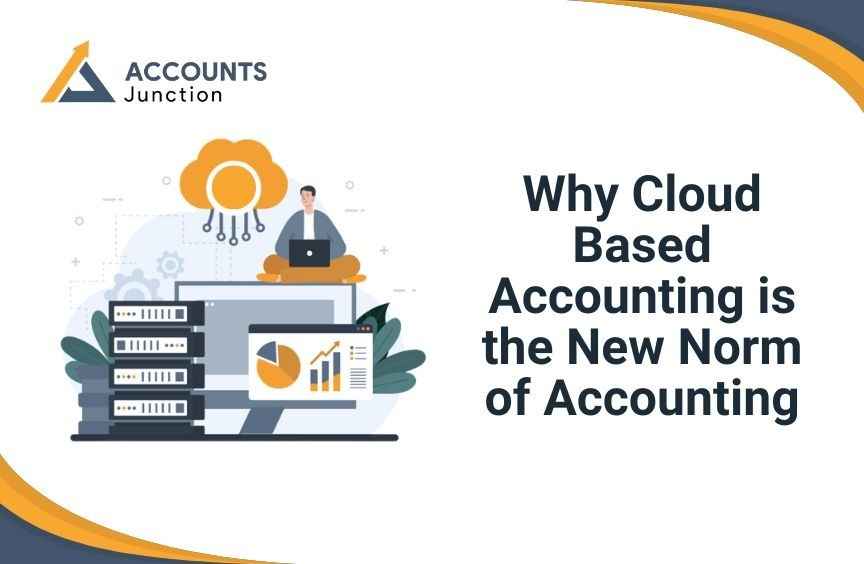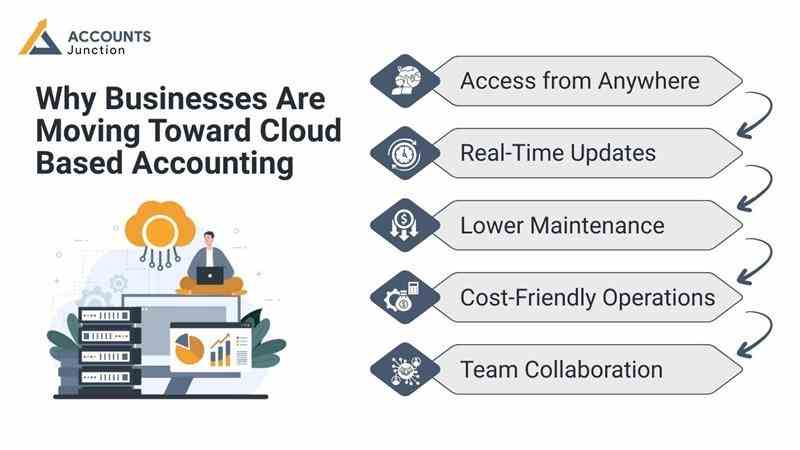
Why cloud based accounting is new norm of accounting
Once upon a time, accounting lived inside thick books and office drawers. Files stayed locked, data moved slow, and updates took days. Then came something lighter — something that did not sit in one desk but floated above every screen. Cloud based accounting began to reshape how businesses think, share, and plan. Today, many firms may not even imagine running without it. Yet, this change did not happen overnight. It grew quietly, one login at a time, across offices, homes, and even mobile screens.
Understanding Cloud Based Accounting
What does it really mean?
Cloud based accounting is like keeping your books online instead of your computer. The records, reports, and receipts are stored on remote servers. You can open them anywhere, anytime, with an internet connection.
How does it work?
- The data is uploaded to a cloud platform
- The system updates itself automatically
- Accountants and teams can access the same file together
- Backups happen in real time
- Security checks run in the background
So, rather than keeping financial data in one device, it stays inside a shared space managed by accounting software providers.
Why Businesses Are Moving Toward Cloud Based Accounting
Something about the cloud feels freeing. Businesses that once depended on in-house systems may now run faster with fewer walls.
Let’s see why so many firms are switching.
1. Access from Anywhere
Cloud based accounting may allow owners to open their books while traveling or meeting clients. A manager in one city and an accountant in another can work on the same file without delay.
It turns accounting into a living system — open, active, and always within reach.
2. Real-Time Updates
Gone are the days of waiting for monthly reports. With the cloud, data changes the moment you type it in. Sales, expenses, and balances refresh live.
Real-time access may help teams act faster when trends shift or costs rise.
3. Lower Maintenance
When software lives on your device, updates and bugs follow you. But when it lives in the cloud, providers handle most of it.
You may not need to install updates or worry about space. Everything runs online and syncs automatically.
4. Cost-Friendly Operations
Many businesses find it lighter on the budget. There is no need for heavy hardware or a full IT setup. Most cloud platforms offer flexible plans, where you pay only for what you use.
This makes cloud based accounting a practical choice for startups and small firms.
5. Team Collaboration
It feels easy when everyone can see the same sheet. Accountants, managers, and auditors can log in together and make edits that appear instantly.
This shared visibility may improve trust and speed. No long email chains or version mix-ups. Just one clear record in the cloud.
The Soft Side of the Cloud
A change not only of tools but of thinking
Cloud based accounting is not only about numbers. It changes how teams connect with their work. It may invite more openness, more flow, and more care in decisions.
Employees can feel part of a shared financial rhythm. Owners can sense the pulse of their business without waiting for long reports.
Flexibility for Growth
As a business grows, the cloud grows with it. You can add more users, more features, or new systems — without heavy setups.
This flexibility can make expansion less stressful. The system bends, not breaks.
Work-Life Balance
Remote work has become part of modern life. Cloud based accounting makes it possible for accountants to work from home or while traveling.
For many, this balance may mean fewer late nights at the office and more productive mornings anywhere.
The Role of Security and Trust
Is cloud accounting safe?
That’s a question every business asks. Security is often the strongest pillar of cloud based systems. The data is encrypted, meaning even if someone tries to see it, it looks like unreadable code.
Backup copies are stored automatically in multiple locations, so your data is rarely lost. Yet, businesses still must choose providers with strong security measures and verified certifications.
Shared Responsibility
Security in the cloud may be a shared job. Providers protect the system, while users must set strong passwords, manage permissions, and avoid risky links.
Together, this partnership creates a safety net for sensitive information.

Comparing Cloud Based and Traditional Accounting
|
Feature |
Traditional Accounting |
Cloud Based Accounting |
|
Access |
From office computers only |
From any location with internet |
|
Updates |
Manual and time-consuming |
Automatic and real-time |
|
Storage |
Physical servers or files |
Online servers (cloud) |
|
Cost |
Hardware and maintenance heavy |
Subscription-based, scalable |
|
Collaboration |
Limited to one device |
Multiple users at once |
|
Backup |
Manual copies needed |
Automatic cloud backups |
How Cloud Accounting Helps Decision Making
Numbers mean little if they come late. Cloud based systems may help decision-makers see updates instantly, so they act with more clarity.
Better Visibility
The dashboard gives a live snapshot of sales, costs, and cash flow. Managers may spot patterns early, like rising expenses or fast-selling products.
Forecasting and Planning
Since the data stays fresh, forecasting can feel more accurate. Businesses can plan budgets or set goals with more confidence.
Easier Compliance
Tax calculations, invoice tracking, and audit trails all become easier. The system logs every change, so records stay neat and traceable.
The Rise of Cloud Based Accounting Software
Common Platforms Businesses Use
Many tools are now built fully on the cloud. A few popular ones include:
- QuickBooks Online
- Xero
- Zoho Books
- FreshBooks
- Wave Accounting
Each platform offers features like automated invoicing, expense tracking, and live dashboards.
Integration Power
These platforms connect with other tools such as CRM, payment apps, and payroll systems. This connected web may create a smooth financial workflow across departments.
The Human Side of Automation
While machines handle repetitive work, humans focus on analysis and advice. Accountants may spend less time entering data and more time helping clients understand what those numbers mean.
It is not about replacing people but freeing them.
A New Role for Accountants
The modern accountant is now a guide, not just a bookkeeper. Cloud based accounting gives them tools to offer deeper insights, faster reports, and more personal service.
Challenges that May Come in using Cloud Based Accounting
Even the cloud has its cloudy days.
Internet Dependence
No internet means no access. So, a stable connection becomes a must for smooth use.
Learning Curve
Moving from desktop to cloud software may take time. Teams need training and patience to adapt.
Subscription Costs
While cloud systems save hardware costs, monthly plans can add up over time. Businesses should review usage and choose plans wisely.
Accounting once lived inside locked cabinets. Now, it drifts among clouds, open to those who dare to work smarter. Cloud based accounting is not just a new tool — it is a quiet revolution that may soon define the very soul of modern business. Want to explore how cloud based accounting can benefit your business? Contact Accounts Junction now!
FAQs
1. What is cloud based accounting?
- It is online accounting where financial data is stored and managed on cloud servers instead of computers.
2. Can small businesses use cloud accounting?
- Yes, most cloud platforms are built with small businesses in mind and offer flexible pricing.
3. Is the data safe in cloud accounting?
- Most providers use encryption and backup methods to keep your data secure.
4. Do I need special equipment for cloud accounting?
- No, you just need an internet connection and a device like a laptop or phone.
5. Can I access my data anytime?
- Yes, you can open it anywhere and anytime through secure login.
6. Does it reduce manual work?
- It can reduce manual data entry since most updates happen automatically.
7. Can multiple users work at once?
- Yes, many people can access and edit records together in real time.
8. Do updates happen automatically?
- Yes, software updates and backups run in the background without user effort.
9. What if the internet goes down?
- You may lose access temporarily, but data stays safe on the cloud.
10. Are cloud systems expensive?
- Most are affordable with pay-as-you-go or subscription models.
11. Is training needed to use cloud accounting?
- Basic training helps users get familiar with new features and workflows.
12. Can it connect with other apps?
- Yes, many cloud tools link with payment, payroll, or CRM systems.
13. Is cloud accounting only for big firms?
- No, even freelancers and small shops can benefit from it.
14. Can data be exported to local storage?
- Yes, you can download reports or full backups when needed.
15. Does cloud accounting support tax filing?
- Most platforms include tax calculation and filing features.
16. How often is the data backed up?
- Backups usually happen automatically and regularly.
17. Can accountants work remotely with it?
- Yes, they can log in from anywhere and handle client accounts.
18. Does it need maintenance?
- The provider handles most maintenance and system updates.
19. What makes it better than traditional accounting?
- It offers real-time access, shared work, and fewer setup costs.
20. Will cloud accounting replace desktop systems?
- It may, as more firms continue shifting toward online platforms.
